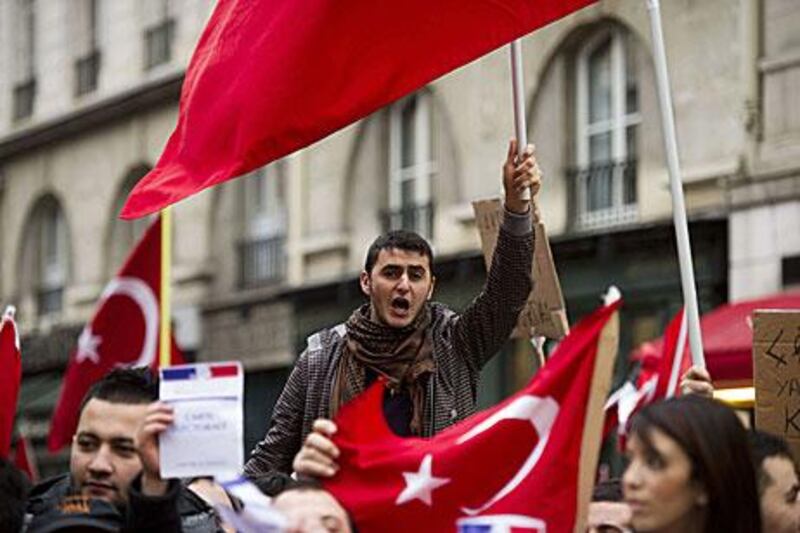ISTANBUL // Turkey suspended political ties and military cooperation with France yesterday after the French parliament passed a bill making it illegal to deny the Armenian genocide.
Legislators overwhelmingly passed the bill, ignoring warnings from Turkey of a diplomatic crisis and an economic backlash. There was no official vote count in the lower house of parliament, where members simply voted by raising their hands.
The measure now goes to the Senate, which is expected to vote early next year.
The Turkish prime minister, Recep Tayyip Erdogan, said he "strongly condemned" the bill. Ankara recalled its ambassador in Paris immediately after the vote.
The bill says anyone in France who publicly denies the genocide can be jailed for up to a year and fined €45,000 (Dh215,300).
"I would like to once again express my gratitude to France's top leadership, to the National Assembly, and to the French people," the Armenian foreign minister, Edward Nalbandian, said, adding France had "once again proved its commitment to universal human values".
Armenia and its large diaspora has long campaigned for international recognition of the mass killings in eastern Turkey during the First World War as genocide, despite strong denials from Turkey.
About 3,000 French nationals of Turkish origin demonstrated outside the National Assembly peacefully ahead of the vote on a day that also marks 32 years since a Turkish diplomat was assassinated by Armenian militants in central Paris.
"I don't understand why France wants to censor my freedom of expression," Yildiz Hamza, the president of the Montargis association that represents 700 Turkish families in France, said. On Wednesday, Mr Erdogan, said further diplomatic steps against France would be taken if the vote passed. News reports said French companies were likely to be excluded from Turkish defence tenders.
One of the projects expected to be closed for French companies was the tender for an air defence system worth US$4 billion (Dh14.68bn), the reports said.
Also, a German-French helicopter project, the Eurocopter, was unlikely to be chosen by the Turkish military, the reports said. There was no confirmation.
Mehmet Simsek, Turkey's finance minister, has said the government would not call for a boycott of French goods.
French car companies are important employers in Turkey's industrial sector and Ankara would be careful not to disrupt bilateral trade. According to official figures, trade between Turkey and France rose 17 per cent last year to $15 billion.
But even before the vote in Paris, local officials in Turkey announced plans for their own action against France.
Melih Gokcek, the mayor of Ankara, said the city would erect a monument to victims of French colonial rule in Algeria.
Turkish officials were also angry about the refusal of Nicolas Sarkozy, the French president, to discuss the French bill with the Turkish president, Abdullah Gul. Mr Gul tried to call Mr Sarkozy several times in recent days, but did not succeed in getting the French president to talk to him.
Mr Erdogan accused Mr Sarkozy of committing a "diplomatic gaffe".
Armenia, several western countries, as well as many international experts, agree the Ottoman Armenians became the victims of genocide in the final phase of the Ottoman Empire in 1915 and that up to 1.5 million members of that Christian minority were killed in massacres and death marches.
Turkey rejects the term genocide, saying the deaths were the result of a relocation effort under wartime conditions and many Muslim Turks were killed by Armenian militias.
Some Turkish observers say modern Turkey finds it hard to address the Armenian issue because such a debate would trigger questions about some of the founding fathers of the republic, which was created in 1923. Markar Esayan, a Turkish journalist of Armenian descent, says modern Turkey shuns a completely open debate about the events of 1915 because this would expose dark sides of the republic's history that have been hidden from view so far.
"I think the primary reason that we avoid discussing the Armenian massacre is that our beliefs will collapse on us," Esayan wrote in Today's Zaman this week. Some of the men who fought against foreign troops in Anatolia after the First World War, in what the Turks call their War of Liberation that ended with the creation of the republic in 1923, had been involved in the Armenian massacres, he wrote.
"There was a continuity between the collapsing Ottoman Empire and the beginning of the republic," Yavuz Baydar, a newspaper columnist, said in an interview. "As soon as you start discussing this seriously, the very foundations of the republic come into question."
Baydar noted that the debate within Turkey had become more open in recent years. "There is progress," he said, noting that the anniversary of the start of the massacres on April 24, 1915, has been commemorated in Turkey.
He also said the generation of younger businessmen from Anatolian cities was much more open and curious about the Armenian issue than older members of the establishment. "So there is social change, a generational change".
* With additional reporting by Agence France-Presse and Reuters






